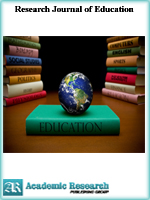Research Journal of Education
Online ISSN: 2413-0540
Print ISSN: 2413-8886
Print ISSN: 2413-8886
Quarterly Published (4 Issues Per Year)

Archives
Volume 2 Number 10 October 2016
Internet Based Model for Postgraduate Students Admission to Higher Education: Case of Tripoli University - Libya
Authors: Abdalmonem Tamtam ; Nura Warag
Pages: 167-176
Abstract
Admission to postgraduate education at Tripoli University - Libya suffers continually from being a slow paced process for students, in which, students have to prepare lots of documents, which require students to be precise and careful not to make any mistakes. Additionally, the procedure takes long time and effort consuming for the staff involved in the preparation and processing of the required documents, as well as, being money consuming for university budget. To resolve these issues an online application system for students’ admission to postgraduate studies at Tripoli University were designed and discussed in this paper. The aim of the system is to speed up processing, time and provide an instant decision. The overall results obtained are encouraging but improvement to the prototype is definitely needed.
Effectiveness of Guidance and Counseling Programs on Academic Achievement among Public School Students in Bungoma South Sub-County
Authors: Negesa Justine V. ; Wesangula M. P. ; Opiyo A. R.
Pages: 159-166
Abstract
In Africa, the concept of Guidance and Counseling although relatively new in educational systems, has been embraced by most governments. Although most African countries recognize the essential role of organized Guidance and Counseling Programmes, there are limited researches studies conducted to assess the effectiveness of the programmed services being implemented to improve the student’s decision making processes that lead to improved future benefits. Research is yet to identify gender specific strategies to positive psychosexual development in boys and girls that can promote safe reproductive health. A wide spread ignorance on the subject of sex is due to the fact that the subject has been surrounded with mystery and beclouded by dark silence. The result has increased curiosity and desire to acquire more knowledge on this forbidden subject; yet, the people entrusted with the responsibility of educating the adolescents on the subject have not made appropriate information readily available. The study investigated effectiveness of guidance and counselling programmes on academic achievement among public secondary school students in Bungoma South Sub-County, Kenya. The study adopted Albert Bandura’s Social Cognitive Theory postulated in 1986. A descriptive research design was used with target population of 52 guiding and counselling teachers. A sample of 16 participants was selected using, using 30% of Mugenda and Mugenda (2003) and randomly selected from 52 schools. Data was collected using structured interview schedule and questionnaire and analyzed descriptively. Results highlights teacher counselling and peer counselling were the most effective strategies in guidance and counselling as compared to students suspension and corporal punishment. More than half of guidance and counselling teachers asserted that schools had inadequate policy and manual procedures and code of ethics and regulation governing sexual behaviour. This paper points at need of guidance and counselling departments to develop policies and manual procedures on sex and relationship education that acts as a reference point to all members of the school. In addition, the Government should set up reproductive health institutions for the youth, promote peer counseling, talks by health providers in schools which has a bearing on students’ performance.



